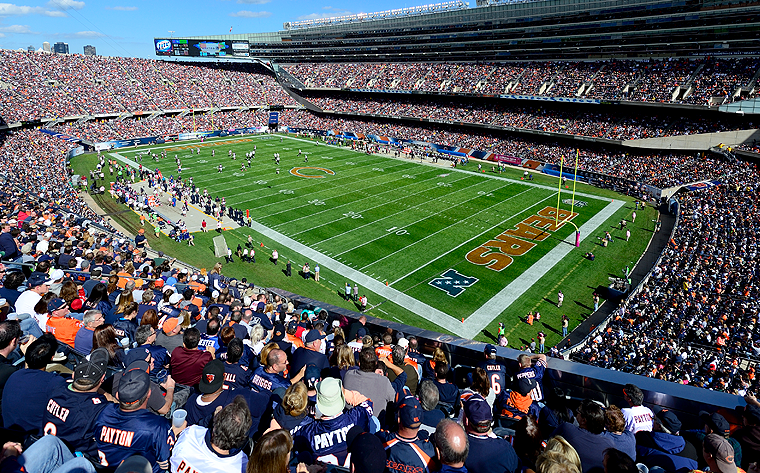
The Chicago Bears are moving forward with a purchase agreement with Churchill Downs for the entire Arlington Park land parcel for a new Bears stadium, with a price tag of $197.2 million.
The agreement comes after three bidders, including the Bears, emerged with formal bids for the 326-acre racetrack site. The Bears are one of the few teams that don’t own their home, meaning that every change, large and small, must be negotiated with the Chicago Park District. It also means that the Bears don’t receive every revenue stream from Bears games at Soldier Field. At 61,500, Soldier Field is the smallest stadium in the NFL. And staying at Soldier Field also likely means the team can’t join the list of NFL and MLB teams ramping up gambling partnerships; the city is not likely to approve any gambling-related development within or next to Soldier Field. The team’s current lease runs through 2033, though it’s likely there will be a buyout depending on when a new stadium is open. The deal is expected to close by the end of the year or early 2022, with approval necessary for a new stadium, and if you assume it will take at least two years to design and build, we re looking at 2025 for a move.
The Bears are not saying exactly what they have planned yet, but given the popularity of sports/entertainment districts next to stadiums these days (i.e., the Westgate Entertainment District next to Glendale’s State Farm Stadium) and control of a 326-acre site, it’s not hard to envision a complex that includes a billion-dollar-plus stadium (probably along the lines of Minneapolis’s U.S. Bank Stadium–lots of glass and sunlight), a Hall of Fame, retail, bars/restaurants/entertainment and a hotel or two–designed to bring in fans year-round.
“We are excited to have executed a Purchase and Sale Agreement (PSA) for the Arlington Park property,” said Bears President and CEO Ted Phillips in a press statement. “We are grateful to Churchill Downs Incorporated for their efforts to reach this point. We also appreciate the support of Mayor Tom Hayes and the Village of Arlington Heights. Finalizing the PSA was the critical next step in continuing our exploration of the property and its potential. Much work remains to be completed, including working closely with the Village of Arlington Heights and surrounding communities, before we can close on this transaction. Our goal is to chart a path forward that allows our team to thrive on the field, Chicagoland to prosper from this endeavor, and the Bears organization to be ensured a strong future. We will never stop working toward delivering Bears fans the very best experience. We will continue to provide updates on our progress at the appropriate time.”
“This has been an extraordinarily competitive bid process,” said Churchill Downs Incorporated CEO Bill Carstanjen in a press statement. “Congratulations to the Chicago Bears for their professionalism and perseverance. It is clear they are committed to an exciting vision for their team and their fans. We wish them the greatest success and are excited for the opportunity this brings to the Village of Arlington Heights and the future economic development of this unique property.”
This is the latest twist in a 100-year-plus stadium saga for the Bears. The early days of the team had the Bears as a tenant at Wrigley Field, where George Halas negotiated a lease with William Wrigley. By the 1960s, it became clear that Wrigley Field was not a long-term solution for the Bears, with the NFL forcing the team to look for a new venue. In 1971, the solution was Soldier Field, a monstrosity on the downtown waterfront, after a plan to play at Northwestern University was rejected by the Big Ten. By 1975 the Bears also threatened a move to Arlington Heights.
The Bears currently share Soldier Field with MLS’s Chicago Fire. If–or more likely when–the Bears leave, Soldier Field won’t exactly sit empty. It’s a popular concert venue, and one could easily imagine a schedule with four or more high-profile college-football games, as well as international soccer friendlies. Last weekend’s Notre Dame-Wisconsin game drew 59,571 fans, almost a sellout (as noted earlier, 61,500 is considered full capacity). Now, not every college game will draw at that level.
Image courtesy Chicago Bears.
RELATED STORIES: Bears eye Arlington Heights for new stadium site
